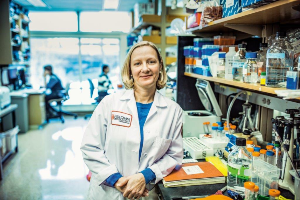The information presented in Oncology News Connection (ONC) eNewsletter is provided for physicians and other healthcare providers only and should not be shared with any current or future patients. If you are not a healthcare provider, we welcome you to sign up for Thrive eNewsletter to receive the latest information and blog highlights from Fox Chase Cancer Center.
Fox Chase Researchers Continue Commitment to Rare GIST Tumors
Several enrolling clinical trials are exploring avenues to overcoming TKI resistance.
The management of gastrointestinal stromal tumors (GIST) was revolutionized with the introduction of tyrosine kinase

Chief of the Division of
Sarcoma Medical Oncology
at Fox Chase Cancer Center.
inhibitors (TKIs). Targeting proteins such as KIT and PDGFRA, TKIs are one of the primary treatment modalities for patients with GIST.
Although the majority of patients with GIST will benefit from one of the FDA-approved TKIs—imatinib, sunitinib, avapritinib, or regorafenib—almost all patients will develop resistance over time.
“Most of the information we have suggests that TKI resistance occurs as a result of secondary mutations within the genes,” said Margaret von Mehren, MD, Chief of the Division of Sarcoma Medical Oncology at Fox Chase Cancer Center. “However, we certainly have identified some other things that are drivers of these cells that may be important to look at as alternative drivers of resistance.”
For example, several years ago, researchers in the lab of Lori Rink, PhD, assistant professor in the Cancer Signaling & Microenvironmentprogram at Fox Chase, identified a potential new target for the treatment of GIST known as Wee1.

Assistant Professor
Fox Chase Cancer Center
“We looked at some kinases apart from KIT and PDGFRA that play an important role in maintaining DNA damage response and replication stress, which are hallmarks of cancer,” Dr. Rink said. “We profiled patient tumor samples and found [Wee1] to be upregulated and hyperactive in patients with GIST.”
Dr. von Mehren and Dr. Rink have received funding from the National Cancer Institute to learn more information about why Wee1 is such a critical kinase in these tumors and how it can potentially be a new therapeutic target in patients who become resistant to standard TKIs.
In addition, Dr. von Mehren is also involved in several other studies designed to look at novel approaches to overcoming TKI resistance in patients with GIST.
Fox Chase is one of four locations recruiting for a first-in-human study of a novel TKI called IDRX-42 (ClinicalTrials.gov Identifier: NCT05489237). The phase 1/1b trial will assess the clinical and pharmacologic profiles as well as the safety of the drug in patients with metastatic or surgically unresectable GIST who have failed at least imatinib due to disease progression.
“Preclinical data for this drug indicated that it seemed to have pan-KIT activity,” Dr. von Mehren said. “The goal is that it hopefully can inhibit secondary resistance mutations more broadly than some of the currently available drugs.”
Finally, Dr. von Mehren is enrolling patients on a second trial looking at a novel combination of drugs in GIST. The international Peak trial is a phase-3 trial of bezuclastinib (CGT9486) plus sunitinib compared with sunitinib alone in patients with locally advanced, unresectable, or metastatic GIST (ClinicalTrials.gov Identifier: NCT05208047).
“Sunitinib is a standard second-line therapy and in combination with bezuclastinib, it seems to have broad activity, hopefully improving outcomes compared to sunitinib alone,” Dr. von Mehren said.
Fox Chase is actively enrolling patients in both of these trials.
“We are committed to improving treatment options for patients with this and other rare tumors not only with this clinical research, but also with basic research in the lab,” Dr. von Mehren said. “These are just the latest developments in over twenty years of work on improving outcomes from patients with GIST.”